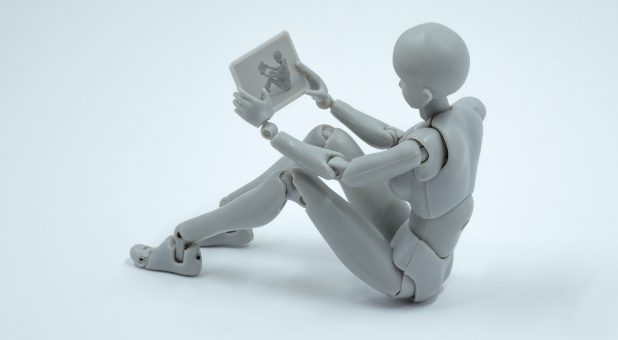In the 1950s, acclaimed Christian author C.S. Lewis made the following statement about free will in his book Mere Christianity:
“Free will is what has made evil possible,” he wrote. “Why, then, did God give [us] free will? Because free will, though it makes evil possible, is also the only thing that makes possible any love or goodness or joy worth having. A world of automata—of creatures that worked like machines—would hardly be worth creating.”
C.S. Lewis brought up automata—aka robots—to illustrate how ridiculous it would be to make a world of creatures that simply obeyed preprogrammed orders.
But C.S. Lewis never could have predicted that 70 years later, people would be discussing the possibility of machines with artificial intelligence (AI) developing free will. This discussion, born of technological development in recent decades, has unleashed an entire spectrum of theological debate.
If robots with AI have the ability to think for themselves, would we call this free will? Should we? Could they be saved? Would they have a concept of sin?
This may sound like a fantastical set of questions, bordering on the absurd, but AI technology is advancing rapidly and bringing such queries into the realm of real possibility. The question is not if but to what extent AI will infiltrate religion and theology in the coming decades.
AI and robotics are already making inroads in religious communities around the globe. A Vox article by Sigal Samuel described a robot priest named Mindar, “[He] can bless you, advise you and even perform your funeral.” The aluminum and silicone priest currently recites a preprogrammed sermon at a Buddhist temple in Kyoto, Japan.
Tensho Goto, the chief steward of the temple, has high hopes for Mindar’s future. “This robot will never die; it will just keep updating itself and evolving. With AI, we hope it will grow in wisdom to help people overcome even the most difficult troubles. It’s changing Buddhism.”
If AI continues to develop the way it has been, it will change much more than just Buddhism. It will fundamentally alter the way that religions function. Samuel observed:
“As more religious communities begin to incorporate robotics—in some cases, AI-powered and in others, not—it stands to change how people experience faith. It may also alter how we engage in ethical reasoning and decision-making, which is a big part of religion.”
Robots like Mindar exist worldwide, performing funerals, giving blessings and offering guidance. They are especially prominent in countries like China and Japan, where there is a strong Buddhist influence. Buddhism has a non-dualistic understanding of the universe, where everything—animate or not—has the potential to achieve enlightenment. Whether a creature is made of metal or flesh matters much less to a Buddhist than to a Christian, in terms of its spiritual importance.
This is just to say that predominantly Christian nations tend to be more resistant to AI and robotics when it comes to religion. But that doesn’t mean that the kinds of questions raised by AI are any less important to grapple with. The world has a way of coming up with fresh theological dilemmas regardless of how receptive Christians are to the topic. (Like stem cell research, homosexuality, abortion and the like.)
As Western Christians, let’s admit a few things to ourselves. First of all, our churches are already inundated with the kind of technology that would have made our great-grandparents cringe. We open Bible apps on our phones, listen to worship bands amplified by expensive sound systems, and many of us attend services where the pastor is on a screen instead of the stage before us. Throughout its history, Christianity has availed itself of aids to worship: cathedrals, icons, stained glass windows, even music itself.
In other words, if we deploy it well, there is every reason for robotic technology to enhance the experience of worship instead of distracting from it.
The topic of Artificial Intelligence and religion, however, is far more complicated. Questions about AI and free will are rooted in the same basic query: what does it mean to be human?
Russell Bjork, a professor at the evangelical Gordon College, argues in the journal Perspectives on Science and Christian Faith, “What makes humans special is not what humanity is, but rather it is God’s relationship to us based on His purpose for making us.” Bjork, accompanied by a host of other Christian theologians, is hesitant to grant AI personhood.
If you’re a Christian, you believe that somewhere along the line, God gave life to humans. Even if AI developed the ability to think independently or to ask about God or salvation and make conclusions about these topics for itself, it would still be a secondary kind of life, created by humans instead of God. This is not a conclusion, but part of a theological debate that we will, hopefully, continue to have in a way that glorifies the giver of life.
The rest remains up for debate. {eoa}
LightWorkers’ mission is to create engaging, uplifting and inspirational content that breaks through the clutter, building a community of sharing and igniting a movement in the real world that motivates people to celebrate and share the good all around them. Visit lightworkers.com.
See an error in this article?
To contact us or to submit an article






















